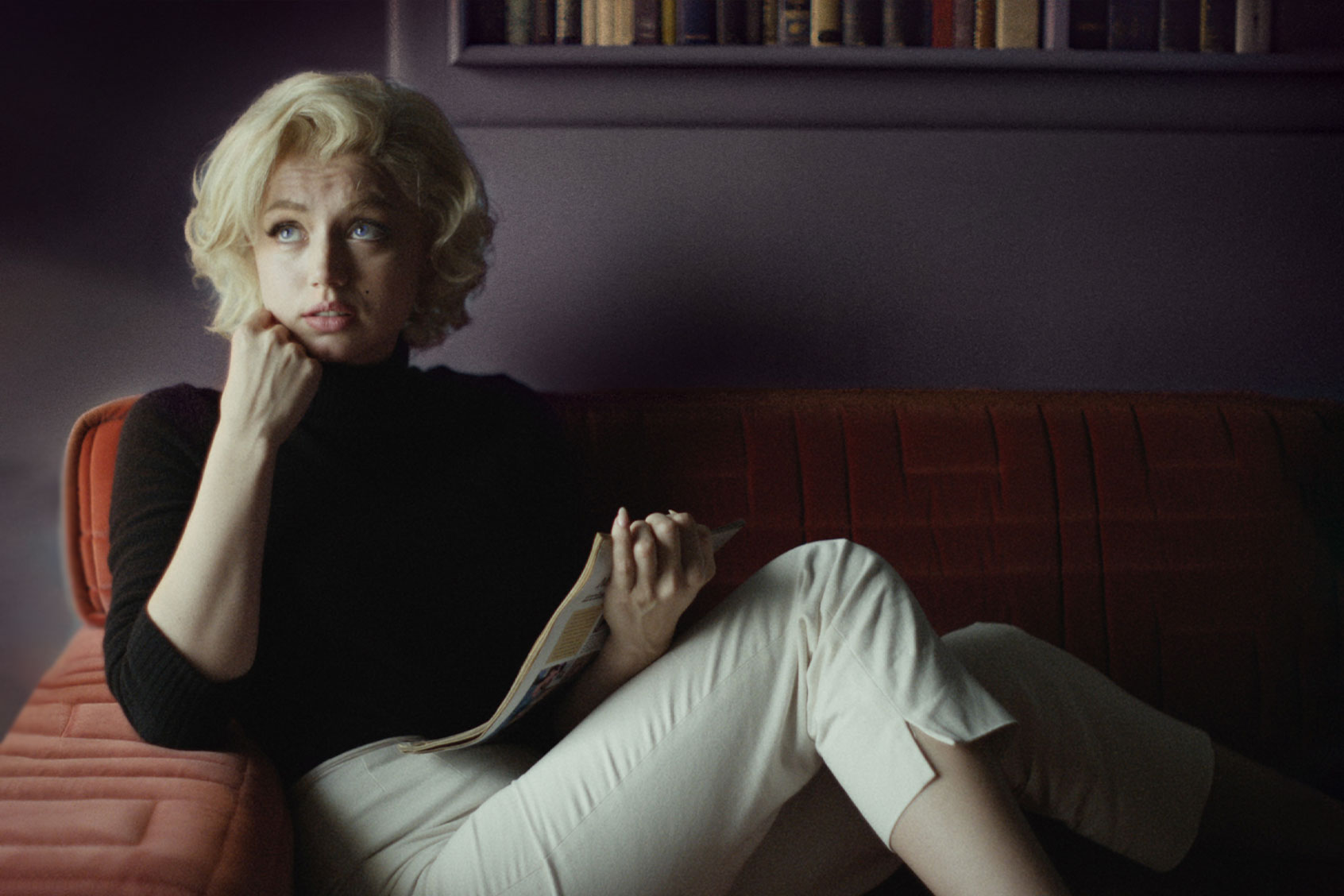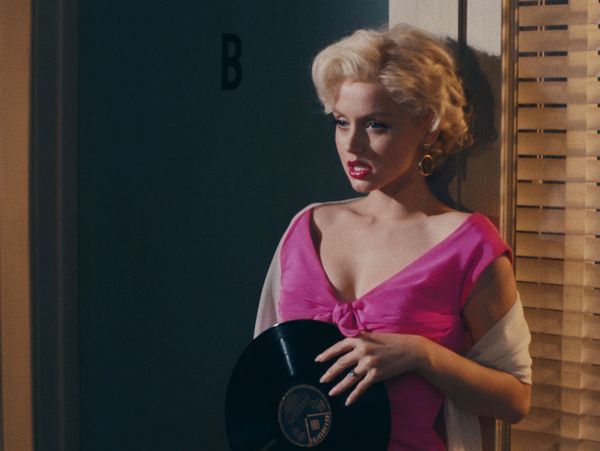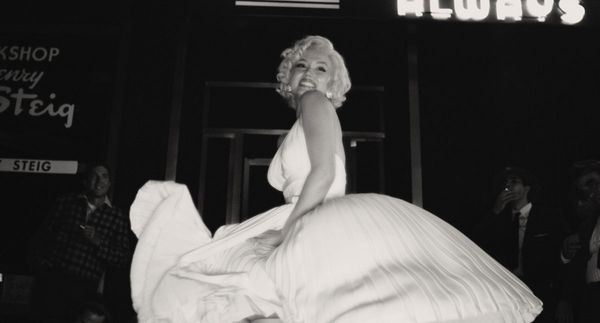
Here's a hot take: "Blonde" is the worst Netflix entry in the tragic icon genre since "Diana: The Musical." Andrew Dominik's insufferable NC-17 adaptation of Joyce Carol Oates' novel of the same name is to Marilyn Monroe what cubic zirconia are to diamonds. One only has to look — hard as that may be — at a laughable, ersatz recreation of Monroe's classic musical number from "Gentlemen Prefer Blondes" to get a whiff of how bad this stinker is.
One of the major problems (and there are many) is that Monroe is portrayed by a woefully miscast Ana de Armas, who only barely captures Monroe's breathy voice, often talking in a whisper to simulate it. And she doesn't quite look like Monroe either, other than the signature blonde mane. Viewers might even expect the beauty mark on her face to disappear whenever she cries, which is often.
But most importantly, de Armas never makes viewers feel for her tragic Monroe. The film is meant to get in her mindset, but mostly, one feels for de Armas, whose body is exploited in numerous gratuitous nude scenes, and one excruciating oral sex sequence with "The President" (Caspar Phillipson), who forces her to go down on him while he is on a call about various accusations. It is typical of "Blonde" to feature Monroe achieving an orgasm with her two lovers Cass (Xavier Samuel) and Eddy (Evan Williams) fondling her nether regions while she is in a crowded theater watching herself cry out in fear during a trailer for her film, "Niagara."
When Cass (Charlie Chaplin's son) and Eddy (Edward G. Robinson's son) first seduce Monroe, she acts like she doesn't know what's going to happen, but then she becomes part of a threesome that hits the gossip sheets. Their sex scene is shot in a dreamy, stylized way that is so bizarre it feels like something out of a 1960s Radley Metzger soft-core porn film.
Dominik is hardly subtle, and "Blonde" is not meant to be a proper biopic. It is billed as a "fictionalized chronicle of the inner life of Marilyn Monroe" and certainly an examination of the celebrity culture that ate Monroe up and spit her out. There are scenes of paparazzi, throngs of fans, and standing ovations that celebrate the awe the actress generates, but these moments have no impact — and they should.

Dominik emphasizes Monroe's abandonment as the child Norma Jeane (played by Lily Fisher) in 1933, when her mom Gladys (Julianne Nicholson) tells her about her absent father before going mad and getting abusive. Gladys is institutionalized, and Norma Jeane is dropped off at an orphanage.
Monroe, therefore, is always looking for daddies in her work and her personal life. Cue Monroe's song "Every Baby Needs a Da-Da-Daddy." Her relationships with both The Ex-Athlete, Joe DiMaggio (Bobby Cannavale), and the Playwright, Arthur Miller (Adrien Brody), are depicted crudely, as is her longing to be a mother and her painful abortions.
"Blonde" concentrates largely on Monroe's career years, starting with a clip from "All About Eve." When she auditions for a leading role in "Don't Bother to Knock," she draws on her memories for the screen test only for the director to react by fixating on her ass. (An earlier scene had her sodomized by an executive during a meeting; Dominik focuses on her ass in that scene, too.) Later in the film, the famous scene in "The Seven Year Itch" is recreated, and it features her billowing skirt and Monroe claiming, "Isn't it delicious?" (referring to the ventilation from the subway.) Her then husband DiMaggio is incensed by this display, but viewers never learn how Monroe feels about this "Seven Year Itch" moment, which may be the most interesting aspect of that famous scene. DiMaggio later obtains some nude photos of his wife and abuses her.

Monroe suffers considerable psychological, physical, and sexist abuse throughout "Blonde," and yet the film holds no cumulative power. Watching Monroe haunted by her demons and wandering nude around a house, reveals nothing more than the actor's body. (Dominik shifts back and forth between color and black and white throughout the film to irritating effect). She has a horrific abortion in a sequence that is meant to be shocking but comes off as a campy nightmare. And her difficulties on the set of "Some Like It Hot," while very real — she resents being called "Jell-O on springs" — leads to her taking drugs and succumbing to addictive behavior. A scene where a drugged-up Monroe vomits directly into the camera twice may be the film's nadir.
"Blonde" is all over the place but goes nowhere. And at 2 hours and 47 interminable minutes, it should offer some insight for the investment of time and energy. Dominik and de Armas struggle to illuminate Monroe's character, as well as her conflicts about her career and her well-being. The film just repeatedly underscores that Monroe only wanted her father and features her reading letters he sends her that hold her interest only.
The film's overarching point is that Monroe was misunderstood and underestimated. When she namedrops Chekhov and Dostoyevsky, folks, including Arthur Miller, are impressed that she reads(!) which is insulting. But even when she talks about wanting to have a good, simple life, and a family, it, too, feels hollow. Yes, Monroe wants to be taken seriously, but "Blonde" never feels sincere.
"Blonde" is currently in theaters and now streaming on Netflix. Watch a trailer via YouTube.







